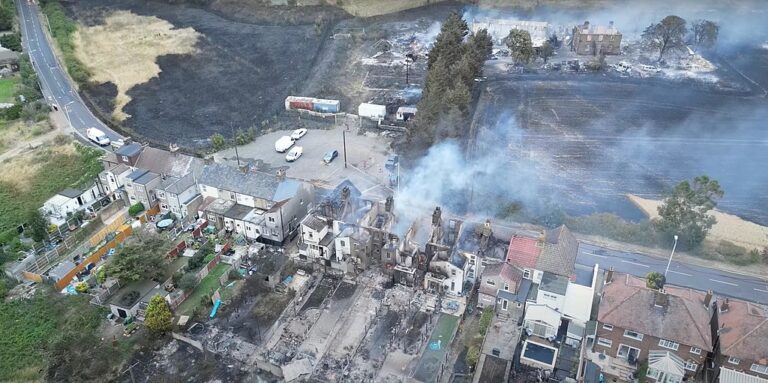Evidence submission and comments on the London Plan consultation

Aerial view of the Wennington wildfire, London, 19 July 2022. Image made by Harrison Healy, from www.youtube.com/watch?v=JOWtjcWytmA
Download
This is a submission made to the Mayor of London’s consultation on the next London Plan, the strategic framework that guides and shapes London’s development. The consultation ran from 9 May to 22 June 2025.
Main messages
- London’s adaptation and resilience to the growing impacts of climate change is fundamental to prosperity and wellbeing in the capital. Many of the direct impacts on London, including more frequent and intense rainfall events and heatwaves, are already causing loss, damage and suffering. These impacts will continue to increase at least until the world reaches net zero emissions of greenhouse gases.
- Without adaptation to improve London’s resilience to the impacts of climate change, growing numbers of lives and livelihoods will be damaged and lost and the capital will find it difficult to compete for workers against other cities that are more resilient.
- While London has made some progress on adaptation, such as the Thames Estuary 2100 project and the new London Surface Water Strategy, it remains vulnerable and exposed to current impacts, and will become more so over the next 25 years without significant further investments in adaptation.
- Climate change adaptation and resilience should be a priority at both national and local levels, including in London. However, as the Climate Change Committee has made clear, the UK is not adequately prepared for the impacts of climate change, and recent governments, including the present one, have failed to make adaptation a priority.
- The Mayor of London, Sadiq Khan, demonstrated leadership on this issue when he commissioned in 2023 a review by Emma Howard Boyd of the capital’s climate change resilience. The final report of the London Climate Resilience Review, which was published in July 2024, concluded that although progress had been made in some areas, London was significantly exposed and vulnerable to climate change impacts, such as extreme heat.
- The Mayor committed to taking forward those recommendations aimed at him and the Greater London Authority. He also pledged to fully develop an adaptation delivery plan. However, this plan has not yet been made public, and it is not clear what resources have been earmarked for delivery.
- As such, the London Plan is, at present, the most significant way in which the Mayor can indicate how he will take forward the Review’s recommendations, but the consultation document does not make these recommendations a central theme and only explicitly mentions the Review twice in 76 pages.
- The Grantham Research Institute on Climate Change and the Environment, as a member of the London Climate Ready Partnership, will continue to contribute to the implementation of the London Climate Resilience Review, particularly through the development of an overall vision and strategy for adaptation and resilience in London, the creation of a new heat risk management strategy that is developed and delivered by stakeholders across the capital, and outreach and engagement across the many boroughs and sectors of London.

